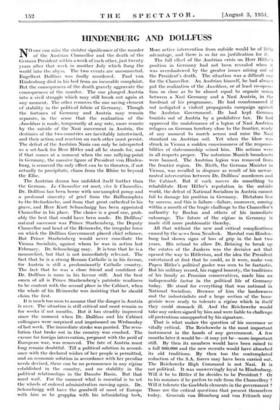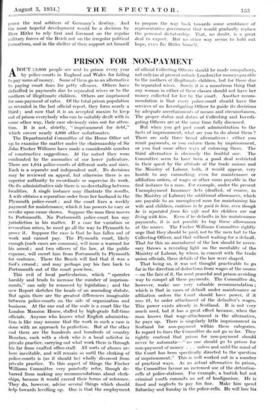HINDENBURG AND DOLLFUSS
NO one can miss the sinister significance of the murder of the Austrian Chancellor and the death of the German President within a week of each other, just twenty years after that week in another July which flung the world into the abyss. The two events are unconnected. Engelbert Dollfuss was foully murdered. Paul von Hindenburg died in his bed from an incurable complaint. But the consequences of the death gravely aggravate the consequences of the murder. The one plunged Austria into a civil struggle which may still break out again at any moment. The other removes the one saving element of stability in the political fabric of. Germany. Though the fortunes of Germany and Austria may remain separate, in the sense that the . realization of the Ansehluss is made, temporarily at any rate, more remote by the suicide of the Nazi movement in Austria, the destinies of the two countries are inevitably intertwined, and their action and reaction on each other must persist. The defeat of the Austrian Nazis can only be interpreted as a set-back for Herr Hitler and all he stands for, and if that comes at a moment when the one rallying-point in Germany, the massive figure of President von Hinden- burg, is removed the only effect can be to threaten, if not actually to precipitate, chaos from the Rhine to beyond the Elbe.
The Austrian drama has unfolded itself further than the German. Le Choneelier est mort, vive le Chaneelier. Dr. Dollfuss has been borne with unexampled pomp and a profound sincerity of grief from the Ballhausplatz to the Stefankirche, and from that great cathedral to his grave, and Herr Kurt Schuschnigg has been appointed Chancellor in his place. The choice is a good one, prob- ably the best that could have been made. Dr. Dollfuss' natural successor was Prince Starhemberg, the Deputy Chancellor and head of the Heimwehr, the irregular force on which the Dollfuss Government placed chief reliance. But Prince Starhemberg would never conciliate the Vienna Socialists, against whom he was in action last February. Dr. Schuschnigg may. It is true that he is a monarchist, but that is not immediately relevant. The fact that he is a strong Roman Catholic is in his favour, for Austria is still a predominantly Catholic country. The fact that he was a close friend and confidant of Dr. Dollfuss is more in his favour still. And the best omen of all is Prince Starhemberg's patriotic readiness to be content with the second place in the Cabinet, when the whole of his Heimwehr was insisting that he should claim the first.
It is much too soon to assume that the danger in Austria is over. The situation is still critical and must remain so for weeks if not months. _ But it has steadily improved since the moment when Dr. Dollfuss and his Cabinet colleagues were surprised, and imprisoned -on -Wednesday of last week. The immediate stroke was parried. The revo- lution that broke out in.the .country was crushed. The excuse for foreign intervention, pregnant with the peril of • European war, was removed. The fate of Austria must long remain doubtful. Till a political solution in accord- ance with the declared wishes of her people is permitted, and an economic solution in accordance with her peculiar needs devised, there can be no permanence in any regime established in the country, and no stability in the political relationships in the Danube Basin. But that • must wait. For the moment what is essential is to set the wheels of ordered administration moving again. . Dr.. Schuschnigg will have the goodwill of most of Europe with him as he grapples with his intimidating task. More active intervention from outside would be of little advantage, and there is so far no justification for it.
The full effect of the Austrian crisis on Herr Hitler's position in Germany had not been revealed when it was overshadowed by the greater issues arising out of the President's death. The situation was a difficult one for the Chancellor. An Austrian himself, he had always put the realization of the Anschiuss, or at least co-opera- tion so close as to be almost equal to organic uniou between a Nazi Germany and a Nazi Austria, in the forefront of his programme. He had countenanced if not instigated a violent propaganda campaign agailbt the Austrian . Government. He had kept German tourists out of Austria by a prohibitive tax. He had approved the maintenance of a legion of Nazi Austrian refugees on German territory close to the frontier, ready at any moment to march across and raise the Nazi standard on Austrian soil. Yet when the blow was struck in Vienna a sudden consciousness of the responsi- bilities of statesmanship seized him. His actions were in all respects proper. The notorious Munich broadcasts were banned. The Austrian legion was removed from the frontier region. Dr. Rieth, the German Minister in Vienna, was recalled in disgrace as result of his unwar- ranted intervention between Dr. Dollfuss' murderers and the Cabinet. But if such moves do something to rehabilitate Herr Hitler's reputation in the outside world, the defeat of National Socialism in Austria cannot fail to damage his position in Germany. Dictators live by success, and this is failure—failure, moreover, coming within a month of the tragic challenge to the Chancellor's authority by Roelun and others of his immediate entourage. The future of the regime in Germany is made still more problematic thereby.
All that without the new and critical complications caused by the news from Neudeck. Marshal von Hinden- burg had shown signs of loss of grip in the last two years. His refusal to allow Dr. Bruning to break up the estates of the Junkers was the decisive act that opened the way to Hitlerism, and the idea the President entertained at first that he could, as it were, make von Papen Hitler's political gaoler was seen to be fantastic. But his military-.record, his rugged honesty, the traditions of his family as Prussian conservatives, made him an indispensable factor in the political life of Germany today. He stood for everything that was national in National Socialism. Because of him the landowners and the industrialists and a large section of the bour- geoisie were ready to tolerate a regime which in itself they could stomach ill. And the Reichswehr would take any orders signed by him and were liable to challenge all pretentions unsupported by his signature..
. That is what makes the question of his successor so vitally critical. The Reichswehr is the most important instrument in the . hands of any government. A few months later it would be—it may yet be—more important still. By then its members would have been. raised to a full 300,000 and the new -recruits would have absorbed its old traditions. By then too the contemplated reduction of the S.A. forces may have been carried out. The Reichswehr High Command is not Nazi. It is not political. It was unswervingly loyal to Hindenburg: Will it be to Hitler if he decides. to be President ? Or to his nominee if he prefers to rule from the Chancellery ? Will it tolerate the .Goebbels elements in the government ? Those are the critical questions that present themselves today. Generals von Blomberg and von Fiitzsch may prove the real arbiters of Germany's destiny. And the most hopeful development would be a decision by Herr Hitler to rely first and foremost on the regular military forces of the Reich not on the irregular political formations, and in the shelter of their support set himself to prepare the way back towards some semblance of representative government that would gradually replace the personal dictatorship. That, no doubt, is a great deal to expect. But no other way seems to hold out hope, even for Hitler himself.































 Previous page
Previous page